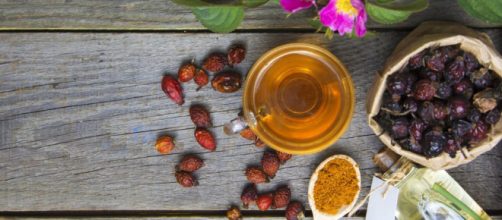Aging is inevitable. As hard as that may be to accept, it is a reality that cannot be avoided. However, while aging is a process that is genetically determined, how well you age is anchored in the type of lifestyle you enjoy. These factors include but are not limited to your diet, stress levels, exposure to harmful Ultra-Violet (UV) rays, pollution and your level of physical activity. One of these factors that an individual usually has the most control over is diet. By taking a closer look at what you eat and making the necessary additions (or subtractions) you can possibly increase the length and Quality Of Life in your golden years.
How exactly does diet impact aging? Foods contain compounds that keep the body hydrated, act as building blocks to cell regeneration, and are components to chemical and metabolic reactions. Food also contains compounds that act as anti-oxidant and anti-inflammatory agents in the body, which specifically combats aging by negating the effects of oxidative stress. Oxidative stress is a by-product of metabolism and can lead to inflammation and breakdown of healthy cells. Prolonged or chronic inflammation has been shown to be a major factor in aging.
There have been numerous studies on the foods that contain these compounds essential to aging, there are a number of foods that are overlooked, and can be considered when looking for foods to add to your grocery list.
Feel free to add to your list the next time you make a trip to the grocery store.
Pumpkin seeds
Pumpkin seeds are underrated nutritious gems. They contain the mineral anti-oxidants zinc which is essential for collagen formation. Collagen is a very important structural protein that can be found in skin, muscles, and bones and plays a role in strengthening blood vessels. It is thus a major component in tissue strength, repair and regeneration, which means it assists in healing infections and in maintaining healthy looking skin, hair and nails at any age. Manganese contained in pumpkin seeds is essential for the healthy functioning of the brain and it is also used to treat specific nervous disorders.
Olives
Olives contain antioxidant and anti-inflammatory properties that may offer natural protection against diseases such as cancer. The risk of developing cancer is increased when cells become overwhelmed by oxidative stress and are damaged due to chronic inflammation. The nutrients in olive can help to combat the ill effects of both these processes. One such compound in olives with anti-inflammatory properties is anti-oxidant is oleocanthal. It also contains antioxidants Vitamin E and Vitamin A. Vitamin A is also needed for good eyesight as people age. One cup of olives can contain as much as ten percent of the daily recommended allowance of vitamin A.
Bone Broth
Bone broth’s popularity has seen a resurgence in the past three years.
It is prepared by simmering the bones, marrow, cartilage, and feet of animals. By slowly cooking over low heat, components that are not normally released by other cooking methods, seek into the cooking liquid, giving a highly nutritious broth. Bone broth tends to contain amino acids, proteins such as glycine, proline, gelatin, and collagen. It may also contain chondroitin sulfates, glucosamine, and zinc, which support joint and immune health. Zinc has been noted to be a mineral that can be deficient in older persons, a deficiency that can have similar to occur in oxidative inflammatory aging (oxi-inflamm-aging) and immunosenescence.
Soursop
This plant is commonly found in many parts of the Caribbean, Mexico and South America as well as some parts of East Asia.
What makes this plant so versatile is that the leaves, flesh of the fruit as well as the seeds of the fruit have been shown to be of value. Soursop has gained popularity over the years as more research is done on its health benefits. The fruit is rich in anti-oxidant vitamin C. This is not the only anti-oxidant contained in this fruit. It also contains acetogenins, as well as quinolones and alkaloids. It also contains a range of B Vitamins that support healthy nerves, skin, eyes, hair, and liver. All vital elements that need support as the body ages.


